

More Absurd iPhone Myths: Third Party Software Panic
Yesterday's More Absurd iPhone Myths: iSuppli, Subsidies, and Pricing took apart misinformation about the cost, subsidy and pricing of the iPhone. Here's a look at the third party software panic orchestrated by analysts who really know better.
Myth 14: The iPhone is soooooo closed, that it's not even a smartphone any more.
ABI Research recently decided the iPhone doesn't qualify as a smartphone, because the group created its own definition of smartphone which includes the phrase "supports third party apps."
Brilliant logic indeed: pay no attention to its features, just remember to repeat the cult-like, ditto head catch phrase: the iPhone isn't smart.



The problem with this apparent logic is that many simple 'feature phones' run Sun's Java 2 Mobile Edition, allowing them to use third party J2ME applets. What's the point of ABI's semantic nonsense?
Why quibble about whether the iPhone is a smartphone or not, based upon undifferentiated criteria in a gerrymandered definition of smartphone?
By Microsoft's definition, a Windows Mobile Smartphone is a phone that lacks a touch screen. Does that also somehow make the iPhone not smart enough to qualify as a smartphone, or is it the other way around?
Solis defended his remarks in comparison to simpler phones that can run third party software by dismissing J2ME and BREW as just being "middleware," saying apps designed for smartphones "can be written to access core functionality from the OS itself, and are therefore usually more powerful and efficient. The competition in an open environment also yields more cutting edge, rich applications."
While it's valid to criticize the iPhone for being a closed platform, it seems odd that sensationalized comments that reinvent the meaning of words were needed. Before dismantling Solis' myth about middleware and “rich mobile applications,” take a look at what else his group is paid to say, and suddenly it all makes sense.
ABI is best known for its "research" in October of last year, which announced the headline "58% of iPod owners may choose Zune." The basis of that prognostication? "Respondents were provided a photo and description of the Microsoft Zune device before being asked about their likelihood to choose it over a competitive MP3 player."
Thank you, ABI, for alerting the public of the Zune's potential viability with your sensationalist press release just prior to the Zune's release! Who could have guessed that, after being handed a carefully worded marketing blurb and a photo of the Zune, well over half of those asked said they might consider buying one?
Doom for the iPod, all you die-hard Apple religious nuts!!! p0wnZerED! Post to Digg: Confirmed! LOLWTFBBQ!
My own research indicates that considerably more than 58% of pseudo-journalists, when handed a carefully worded PR blurb and a photo of the Zune, were at least “very likely” to publish ABI research as news.
Unfortunately for ABI, its counterfeit research, corresponding press release, and subsequent propagation by an uncritical press all did nothing to convince users to shell out $250 for Microsoft's dumpy looking, DRM encrusted, wholly incompatible music player.
Similarly, loudly announcing that the iPhone does not meet "ABI's criteria for being a smartphone" will do nothing to fool the people who actually look at the device.
After comparing the iPhone to every other idiot phone out there, they'll be left wondering just how smart ABI's analysts are, and who is paying them to generate such sensationalist headline garbage and misinformation.
Myth 15: The iPhone Hates Freedom.
While insisting that the iPhone "isn't smart" is plainly absurd, a lot of sane people are questioning the wisdom of Apple's leaving the iPhone closed to third party apps. 

However, rather than examining the issue intelligently, many analysts just repeat more of the War On Apple jingoism, which accuses Apple's potential customers of being crazy religious extremists who hate freedom.
Like other myths, this one is left conspicuously devoid of any context. That's so users won't compare the myth to reality, and dispel the dark magic of FUD with any enlightened critical thought.
Who are the real religious nuts: people interested in an innovative new product, or the angry mob wanting to burn the iPhone on a stake for its reality distorting witchcraft and other dangerous powers that anger the gods, particularly Window Media Zeus and Achilles Palm?
The reality is that existing phones' support for third party apps is almost completely worthless. How many phone apps have you downloaded? How much have you benefitted from third party apps on your phone? How many reputable developers are building third party apps?
The only way to get really upset about the iPhone's third party support is to ignore reality and focus on simple buzzword jingoism, which is just what the purveyors of iPhone fear, uncertainty and doubt are hoping to force feed the media. The next myths take this idea apart further.
Myth 16: Existing third party apps are very useful
What exactly are the "cutting edge, rich applications" ABI’s Solis thinks people are using on Windows Mobile, Palm, Symbian, and Linux smartphones? They simply don't exist! The mobile software market is a joke.
It's simply a myth that existing mobile phones offer some vast library of interesting and useful third party software. Take a look at websites offering mobile downloads for Windows Mobile, Palm OS, RIM, and Symbian. It's nearly all absolute crap! Most existing mobile apps fit into one of these pathetic categories:
-
•Software that solves problems that shouldn't exist
$110 of actual examples of popular Windows Mobile apps unnecessary on the iPhone: -
•memory managers that squeeze apps into the tiny bit of RAM installed: MemMaid $15
-
•File manager: Virtual Explorer $25
"Virtual Explorer is a revolutionary and powerful integrated solution designed to replace the rather restricted features of the standard Pocket PC file explorer." -
•System cleanup, clumsy workarounds: Pocket Mechanic Pro $25
“The ultimate Pocket PC maintenance utility comes re-loaded with features and tools to keep your device and storage cards in perfect shape. Pocket PC Magazine Best Software 2006 Finalist.” -
•File backup: SPB backup $20
-
•Software that should have been provided by the vendor
$344 of actual examples of popular Windows Mobile apps included on the iPhone: -
•real email client: Pocket Informant $25
"replacement for Pocket Outlook on the Pocket PC" -
•real web browser: none seem to exist.
-
•real contacts: Photo Contacts PRO $30
-
•Photo browser: Imageer $15
-
•iPod: Pocket Player MP3 player $20
-
•TV: HandiTV $20 "watch TV from mobile devices"
-
•Dial up networking: PDANet $34 "use your mobile as a modem!"
-
•Calculator: Revolutionary Calculator $30
-
•Touch screen type input: Full Screen Keyboard $10
-
•PDF: PDF Reader $25
-
•Notes: List Pro $30 “Manage your notes”
-
•Software that is absurd
Real titles for Windows Mobile, Palm: -
•Ring Tone Choosers
-
•Ghost Detectors
-
•Love Detectors
-
•Lie Detectors
-
•Propel - $25 "the ultimate launcher - you'll be amazed at how snappy and straightforward launching applications, finding contacts and keeping in touch will be."
-
•Software that is overpriced trash
A $92 selection of popular Palm OS titles already available for $15 on the iPod today:

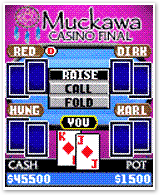
-
•Texas Holdem $20 for Palm, next to the $5 iPod version, and the $8-$8.50 Verizon BREW version
-
•Bejeweled $20
-
•Pocket Tunes $37
-
•Sudoku $15
-
•Verizon Brew apps: crappy games and overpriced video clips and ringtones
-
•Software that will work on the iPhone
free, custom, alternative, open software
Oops, that's right folks: in their unbridled attempts to discredit the iPhone with third party app panic, analysts have seemed to overlook the fact that what passes for "third party apps" on most mobile phones is worthless, and most of what isn't can be put on the iPhone without any involvement or approval from Apple.
More on that in a moment, but first a look at why existing mobile apps are so worthless.
More on that in a moment, but first a look at why existing mobile apps are so worthless.
Myth 17: There is a healthy, vibrant market for today’s third party mobile apps
As the above examples demonstrate, existing mobile apps are mostly overpriced junk. I should point out that the apps listed above were not painstakingly selected from the bottom of the barrel, but were all listed at the top of popular and recommended download lists for Pocket PC; most won’t work on Window Mobile Smartphones.
One of the reasons that mobile apps are mostly all junk is that there is simply no viable market for beyond shareware. This is is due to several factors:
Platform fracture. Palm's OS grew out of a golden age of PDAs half a decade ago, but is mired in legacy today. Windows Mobile is a huge failure, and RIM is too small of a player to maintain a vibrant developer base.
What about smartphone leaders Symbian and Linux? Neither offers a cohesive third party platform. Symbian is only the core OS under competing efforts by Sony's UIQ and Nokia's S60 to put a development layer on top.
To complicate things, there are multiple versions of S60 that are not backward compatible. Symbian starts to sound a lot like Linux, where pointless choices between Gnome and KDE assure few practical choices in commercial software titles at all.
Motorola is using Linux, but only as a kernel for its custom platform. Other vendors using Linux don't offer any common platform, making Linux on mobiles less interesting than Linux on the desktop. Anyone interested in doodling with their phone’s kernel might be excited, but it offers nothing for consumers.
None of these mobile platforms are creating any sort of vibrant software market for mobiles, despite the gushing hyperbole of ABI Research about “cutting edge, rich applications.”
Severe limitations on what can be done on today's toy mobile devices also present barriers to real mobile development. As noted earlier, most phones only have 32 MB or less of usable system RAM available, 128 MB of Flash storage, ultra tiny screens, and are hampered by fractured platforms: the archaic Palm OS, the boondoggle of WinCE, or a customized version of Symbian or Linux with little real development potential.
Middleware failure. Besides UIQ and S60, other vendors have attempted to offer middleware platforms that try provide a lowest common denominator for developers in the mobile arena. Adobe is pushing Flash Lite, Sun its J2ME, and Qualcomm the rival BREW. Microsoft’s WinCE version of .Net could be added, if any serious number of Windows Mobile phones were ever sold.
Support for different flavors of middleware varies according to the phone; Flash Lite is used on the LG Prada phone; different versions of J2ME are available from most platforms, even Palm and WinCE; and BREW is tied to Verizon phones, typically as a subscription service.
Just like the failure of common Java VM development on desktop machines however, mobile middleware development results in lowest common denominator apps that are poorly integrated with native programs, don’t look good, and aren’t easy to use, and are best suited for very simple games and toy applications.
That’s why they’re called craplets.
Lack of a real market. Unless developers get paid for their work, they simply can't afford to risk much investment in doing anything really interesting in mobile development.
The result: popular apps are priced high to get some money out of the few people who actually pay for them, and rampant piracy prevents apps from getting enough support to continue development.
Consider where the real money is in software development: console games. Game developers optimize titles specifically for each platform, and games are typically tied to cartridge or DVD media. If the latest Xbox or PlayStation games were available as simple web downloads, they wouldn't be selling in stores for $50-70 each, they'd all be on torrent sites.
Console games use old-fashioned, physical DRM to create a market. The result is a lot of serious games development, and a variety of real titles that people actually want to buy.
Opening up the Sega Dreamcast did nothing for that platform, because hobbyist developers didn’t actually write any apps worth playing.
That’s the same problem hounding Linux on the desktop: everyone likes the idea of a communist paradise, but only if magical workers do all the work and maintenance for free. As it turns out, supply and demand are really both measured in terms of dollars, not in fantasy wishes and ideological karma points.
With the iPhone, Apple has built a secure and easy to use online distribution system that copies the success of the video gaming industry instead of the failure of various mobile OS and middleware fiascos.
Software is digitally signed to users, which keeps prices low and ensures a real market for software. It's already been demonstrated to work on the 5G iPod. The existing 5G iPod games cost $5, whereas Palm equivalents cost around $15-20.
Other iTunes software should follow the same low cost, high volume pattern that benefits both software makers and software buyers, by creating a market that serves the needs of both.
Myth 8: There is no possibility for third party iPhone apps.
The biggest problem with third party software panic is that there are actually several avenues for third party development on the iPhone, all of which are already far superior to anything on mobiles today.
Online Apps: Remember how everyone is abuzz about Google and its online apps for the desktop? All Google needs to offer its online apps is a web browser, which the iPhone has. You can already SMS queries to GOOGL from existing mobile phones; imagine what Google could offer to the iPhone's real web browser.
Of course, the Google Maps version for the iPhone demonstrates how much better a customized version of such an app is over the existing generic versions of Google Maps for other mobile phones. These are Google’s own screenshots for Palm and a generic phone browser, compared to the iPhone’s custom version:
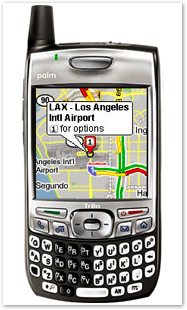
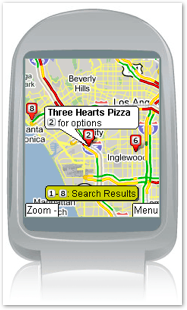

Beyond Google, there is a huge opportunity for custom and vertical web apps and web services that take advantage of the iPhone's WiFi capacity, a feature missing from nearly all the existing phones on the market.
Enterprise support? Are you kidding? Given a web browser and support for IMAP, users won't even need to deal with IT to get mail from Exchange Server. Customized web apps for the iPhone's browser will be a killer app.
Ed Bott seems to think Exchange can only sync with Windows Mobile phones. Perhaps he can get a copy of Tiger from Microsoft and discover for himself that Apple already syncs with Exchange via OWA. Doing so from the iPhone will be trivial, thanks to OS X.
Anyone trying to portray the iPhone as a consumer toy compared to existing mobiles is simply an idiot. Existing mobiles are all toy junk, and everyone knows it. That’s why everyone from Microsoft’s Steve Ballmer to Nokia’s Anssi Vanjoki are sweating bullets as they try to casually shrug off the iPhone.
Reference: One category of popular software left out in the list above is the trivial stuff that anyone can put on the iPhone themselves. Existing “closed” iPods already have support for Notes that can hyperlink to other files and songs on the player.
The iPhone will have support for Leopard’s expanded Notes, but even better, will be able to render web pages. That means no third party hack is needed to install a copy of Wikipedia, or a cross referenced Bible, or a Physician's Desk Reference.
Add in Javascript and you'll be able to do anything one could do in a Dashboard widget; a rich environment on the level of a modern day HyperCard, but able to dynamically access data from the web.
Middleware: Add in Flash support, and you'll be able to run a lot of Flash applet games. Not Flash Lite, but the whole Flash Player. That might be mildly useful in browsing the web, but neither Flash nor Java is needed to power the simple applets that run on most mobile phones, from currency converters to language dictionaries.
That makes the iPhone unlikely to have a Java VM. Good riddance. The whole "Write Once, Deploy Anywhere" mantra of Java has been revealed to be an impractical joke for mobile devices. Java has useful applications elsewhere, but there simply isn't a demand for general purpose applets that can run on every phone.
If the world really wanted generalized sorta-works-everywhere software, we'd be running WinCE on mobiles, Linux on the desktop, and all of our applications would be written for the most minimal version of X Window. All three have been a failure in the mass market, for good reason: the middle of the road is no place to drive.
Sun's Java was largely an imitative effort to deliver its own OpenStep. Steve Jobs knows a thing or two about the history of NeXT, attempts to create a middleware platform, and the difficulty of herding cats in the industry.
After ten years of trying to get the industry to stop shooting itself in the face, Jobs gave up and turned NeXT’s technology into a closed platform for Apple. That strategy paid off in spades. Jobs later advised Microsoft to do the same: build its own music player rather than trying to maintain the failure of PlaysForSure middleware.
Microsoft's Zune failed, but Jobs' Apple has succeeded in developing customized, integrated platforms with clear and practical features: the Mac, the iPod, and now the iPhone.
None of them rely on general purpose middleware to deliver apps that sorta-work-everywhere, because such middleware not a good idea that works in the real market.
The Application Market: If Apple sells ten million by the end 2008, it will have a larger installed base than the Xbox 360 has now, creating a huge demand for software.
Given that Mac users currently buy more than their share of the world's software, it’s not hard to imagine that software demand for the iPhone will be met by the market.
Does it even need to be pointed out that Apple has also been actively soliciting third party developers, and that the only real limitation to third party development is that software will be sold through iTunes?
That will only weed out the Windows Mobile-type developers trying to sell PDF readers for $25 and Verizon BREW rental games that cost $3.50 per month; it won’t prevent the development of good software.
Anyone hooting about the dearth of third party app potential simply hasn't given the subject much thought.
Apple Specific Apps: the last word on third party software panic should be another solution analysts don’t seem to grasp: Apple makes pretty good first party software.
The more than $450 of popular third party software for Windows Mobile listed above is either already provided or is not necessary on the iPhone. That’s enough for the iPhone to pay for itself!
Further, Mac users aren’t exactly searching for desperately for replacements to iLife and other software bundled with Tiger, and Apple’s own games for the iPod have been pretty impressive as well, certainly much better than other games available for mobiles.
What apps do you want to see on the iPhone? Send in your suggestions.
Myth executions continue: security doubts and Enterprise fears.
Next Articles:
This Series


 |
|
 |
|
 Del.icio.us |
Del.icio.us |
 Technorati |
About RDM :
:
Technorati |
About RDM :
:

Monday, January 29, 2007




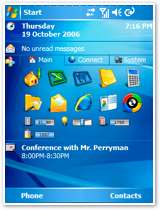


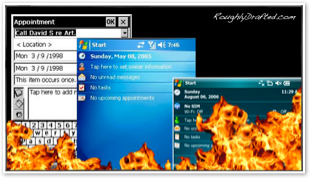
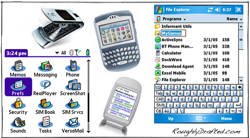


 Send Link
Send Link Reddit
Reddit NewsTrust
NewsTrust






